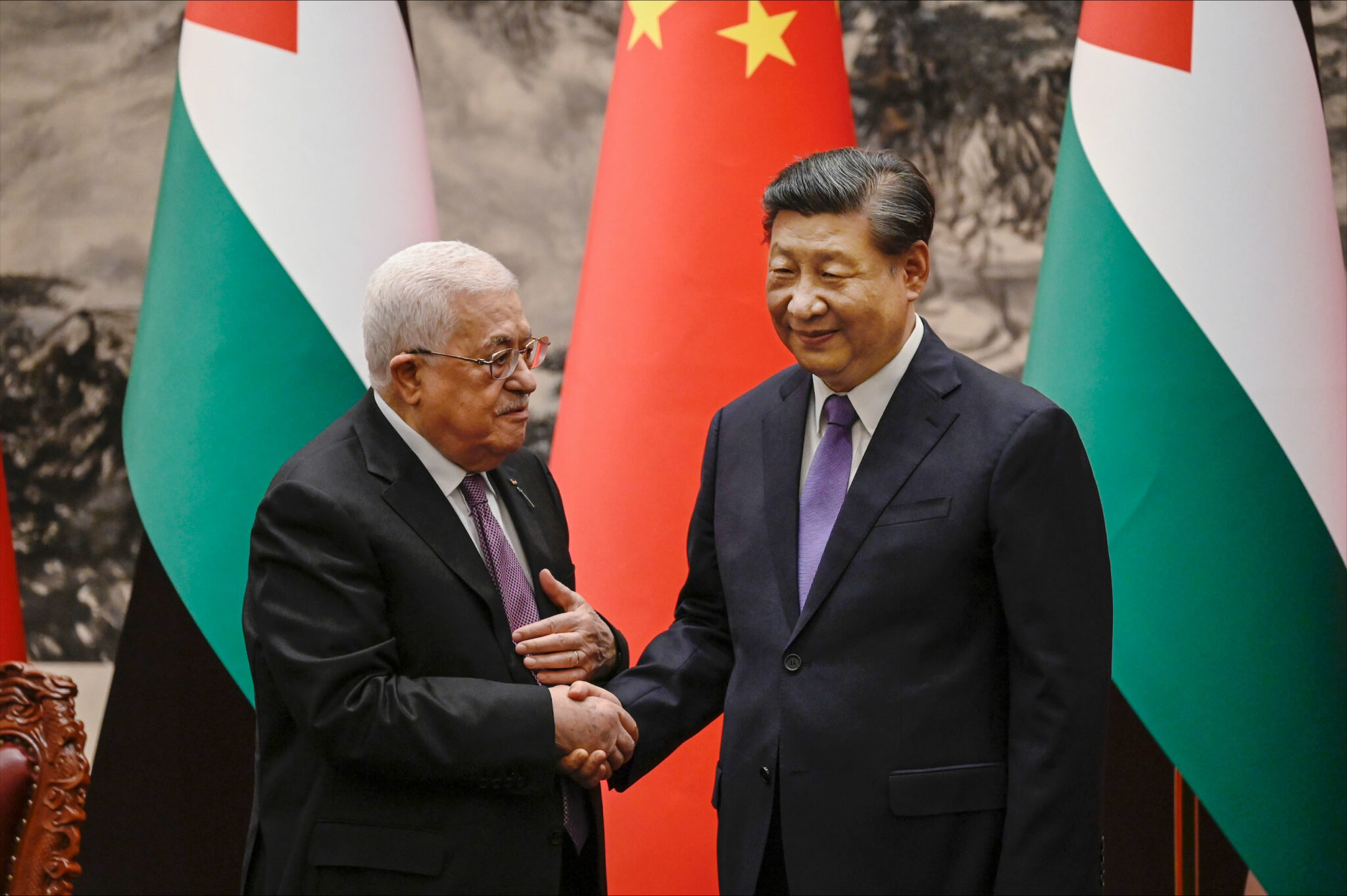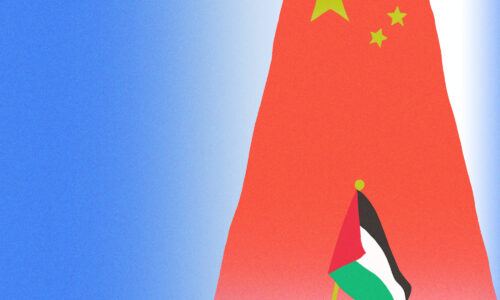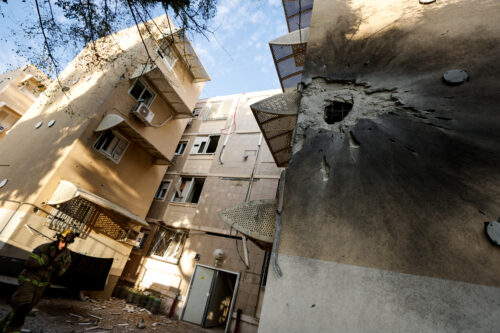China has been trying to keep good relations with Israel, Palestine, and other heavy-hitting Middle Eastern players. Which is why the Israel-Hamas war is a worst-case scenario of sorts, making it impossible for Beijing to exert influence. Its chances of brokering a peace deal seem lost at the moment, this after it had made progress earlier this year after achieving detente between old enemies Saudi Arabia and Iran.
Last week, Beijing consistently refused to condemn Hamas for its surprise attack or name it a terrorist organization. Instead, “China condemns all violence and attacks on civilians,” according to the Ministry of Foreign Affairs spokesperson.
China has used a similarly neutral template in other Middle Eastern conflicts (including between Saudi Arabia and Iran), and in previous Israel-Palestine clashes — in 2008, 2014, and 2021 — each time condemning violence rather than perpetrators.
Beijing has never labeled Hamas a terrorist group. Nor has it, according to Guy Burton, author of China and Middle-East Conflicts, for any other faction in the complicated web of Palestine’s dubious governing body, which includes the authoritarian Fatah that governs parts of the West Bank.
Meanwhile, in a phone call with the Saudi Foreign Minister on October 14, Chinese counterpart Wáng Yì 王毅 took aim at Israel, saying its retaliation had “gone beyond self-defense” and that it should stop its “collective punishment of the people in Gaza.” His statement “felt like another twist of the knife in Israel’s back,” according to Tuvia Gering, an expert in China-Israel relations (and occasional contributor to The China Project). “Israel did not ask and does not want ‘Chinese solutions and Chinese wisdom.'”
“A look at the big picture is probably useful,” says Burton. He explains that so far, important Islamic partners in the Middle East, such as Saudi Arabia, have not previously condemned Hamas, whereas Europe and the U.S. have repeatedly. For China, “this may be a way of maintaining outreach to the Arab world and demonstrating its difference toward the West.”
However, Chinese banks and businesses have also invested over $965 billion in Israel. Israel is a “cooperative strategic partner,” ranking higher than Palestine in China’s hierarchy of diplomatic relations. Yet this has not assuaged “an underlying suspicion and distrust among some Israelis, owing to China’s historic solidarity with the Palestinians,” says Burton.
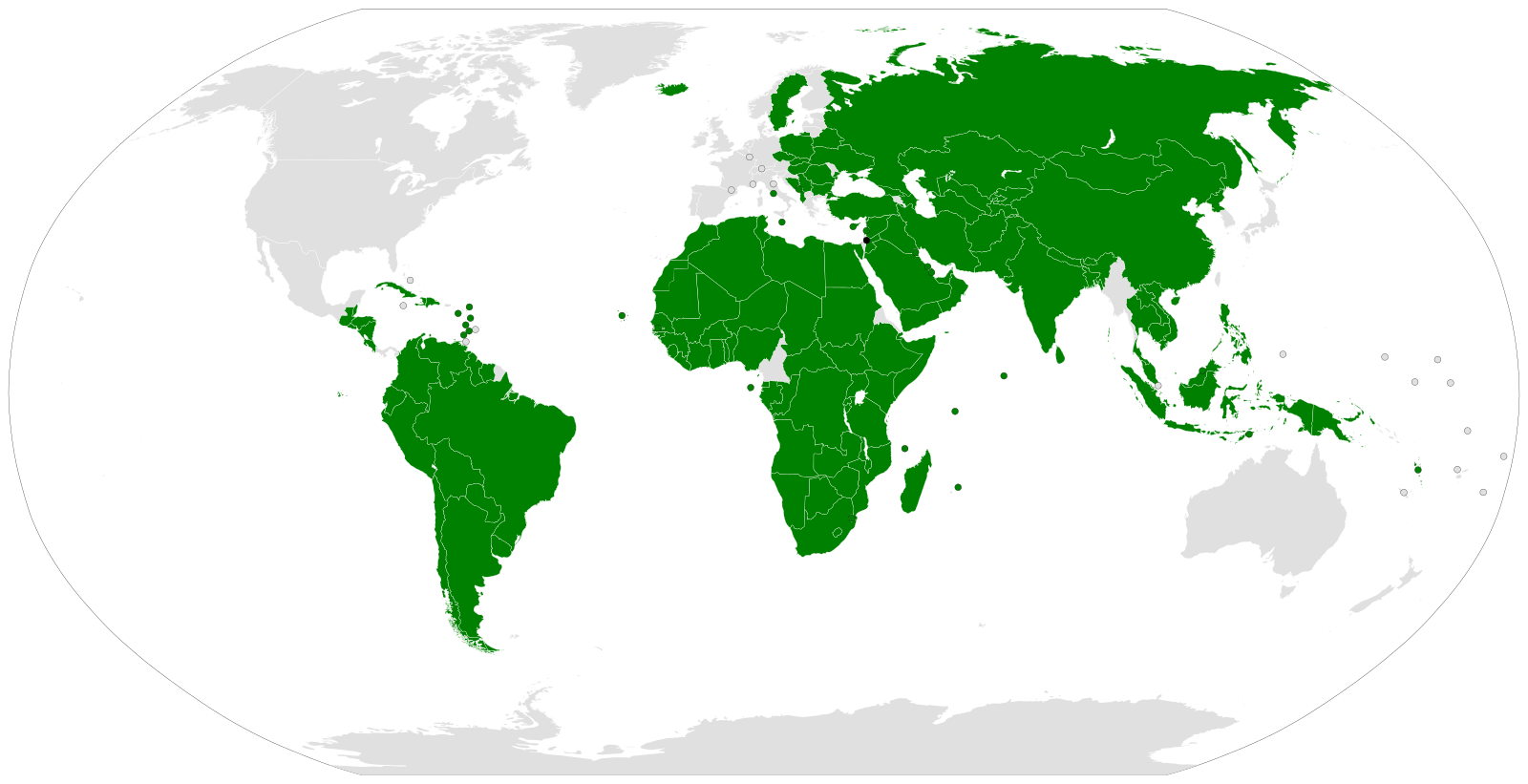
China officially recognized Palestine as a state in 1988, and was the first non-Arab state to forge relations with Palestine back in 1965, when Palestine Liberation Organization (PLO) representatives visited Beijing. During that meeting, Máo Zédōng 毛泽东 compared Israel to Taiwan, saying the two were created by “imperialism” to keep the Arabs and the Chinese in check. Zhōu Ēnlái 周恩来 was more specific, often saying Israel had been created by “American imperialists” and was a threat to neighboring Arab states.
China likely was the main supplier of arms to Palestine at the time, sending around $5 million in military and financial aid between the late 1960s and mid–1970s. By 1970, PLO chair Yasser Arafat said the P.R.C. was the “country which has the greatest influence in support of our revolution and the firming up of its purpose.”
This shifted in the 1980s and 1990s, when the P.R.C. joined the UN Security Council and moved away from supporting rebel groups around the world. It condemned the murder of Israeli athletes at the Munich Olympics in 1972 by the Palestinian group Black September. “We have never been in favor of such adventurist acts of terrorism,” Huáng Huá 黄华, China’s first permanent representative to the UN, said at the time.
But China still campaigned internationally for Palestine, and gave support for the Palestinian authorities (as it would for any other entity it has recognized as a state).
- China voted for a UN resolution that Zionism was a form of racism in 1975.
- It proposed a UN-backed international conference to resolve the conflict in 1984 and 1989.
- China’s Foreign Ministry website shows it repeatedly condemned Israel for “injuring innocent Palestinian civilians” during its assaults on Gaza and the West Bank in the 2000s. But at the same time, China condemned Palestinian suicide bombings in Israel, without mentioning which authority was responsible. When Hamas won a set of elections in 2006, China went against Western boycotts of Gaza, calling Hamas “the chosen representative of the Palestinian people.”
- It voted to allow Palestine UN non-member observer status in 2012.
- It criticized the Trump administration’s 2019 “Deal of the Century,” saying it was too biased toward Israel.
Despite all this, China hasn’t been very active within Palestine itself. From 2008 to 2022, it sent just $11.3 million in aid. Bilateral trade currently stands at a lowly $158 million, around 99% of which are Chinese imports. A free-trade agreement proposed in 2018 has made little progress.
China’s State Taxation Administration reported that in 2018, a paltry $8 million contract agreement in Palestine had made China’s total investment there rise by 194%. The Belt and Road Initiative has not helped much, either — projects are limited to a seven-kilometer-long road, and solar panels in the West Bank and Gaza Strip. Burton cites a lack of interest by Chinese businesses in Palestine’s small market, a lack of certainty on which government to obtain permits from, and reluctance to make risky investments in a conflict-ridden area.
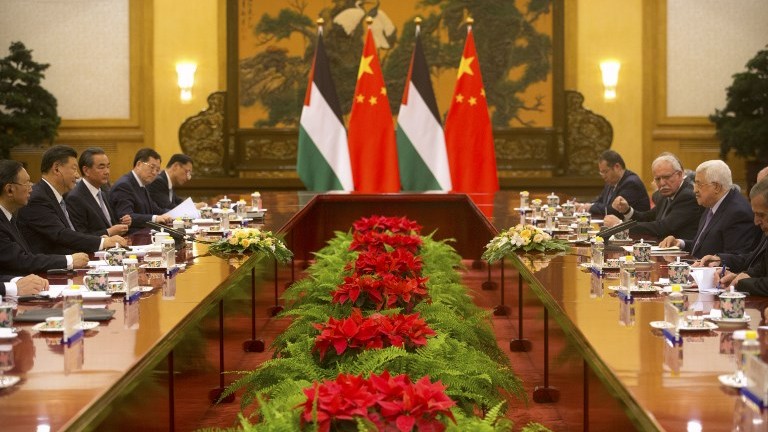
The two sides boosted their diplomatic relations during a visit by Palestinian leader Mahmoud Abbas to Beijing in June this year, with Xi reaffirming China’s commitment to Palestinian statehood and peace talks. Abbas said the two signed agreements for more solar panels and roads, a solar panel factory, and a steel plant. Burton thinks this won’t make a real difference to the relationship — not when Chinese investment and trade with Israel is “magnitudes larger.”
During the visit, Abbas signed off on a five-point joint declaration issued by both sides that affirmed that Palestine adheres to the one-China principle and supports China’s policies in Hong Kong and Xinjiang. “Xinjiang-related issues are not human rights issues, but issues of anti-terrorism, de-radicalization, and anti-separatism. The Palestinian side firmly opposes using Xinjiang-related issues as an excuse to interfere with Chinese internal affairs,” it read.
Aside from offering an Arab defense of China’s repression of Uyghurs, Palestine’s main value to China may be as a gateway to the Islamic Middle East — and as a Gordian knot China can gain prestige by untying. Since at least 1988, China has urged for a “two-state solution.” In this vision, Palestine and Israel recognize each other as separate nations and split Jerusalem down the middle, with Israeli forces withdrawing to the 1967 borders as per a UN Security Council resolution that Israel rejects.
Xi and his diplomats pushed this in a four-point plan unveiled in 2013, with the two separate states boosting each other’s economies through trade. The idea isn’t very original: MERICS points out Xi’s plan is merely a repackaged version of an earlier five-point plan from 2003.
Nonetheless, Xi convened an unofficial symposium of Israeli and Palestinian delegates in 2017, urging for his plan. But as China had not been formally invited to mediate by both sides (a key condition, the Chinese said, for them to help), and Israel’s delegates were unofficial, all decisions made were non-binding.
Some argue that Beijing’s refusal to condemn Hamas’s latest attacks is an own goal, confirming Israeli suspicions of Chinese bias, and scuppering all chances of a China-brokered peace deal. “The Israelis will tend to look at that [refusal of condemnation] and say this is not a neutral arbitrator,” Robert Ford of the Middle East Institute told Politico.
In trying to appear neutral, it’s appeared biased.
Others note China’s hypocrisy in attempting to be a diplomatic heavy-hitter — which means getting sucked into the world’s problems — while maintaining a non-interference policy for itself.
“China under Xi wants to be respected and admired everywhere, including in the Middle East, but it is ultimately unwilling to do what it will take to resolve the really hard regional security issues,” Steve Tsang, the director of the SOAS China Institute in London, told Reuters last week. “It goes for the low-hanging fruits and basically stops there.”
